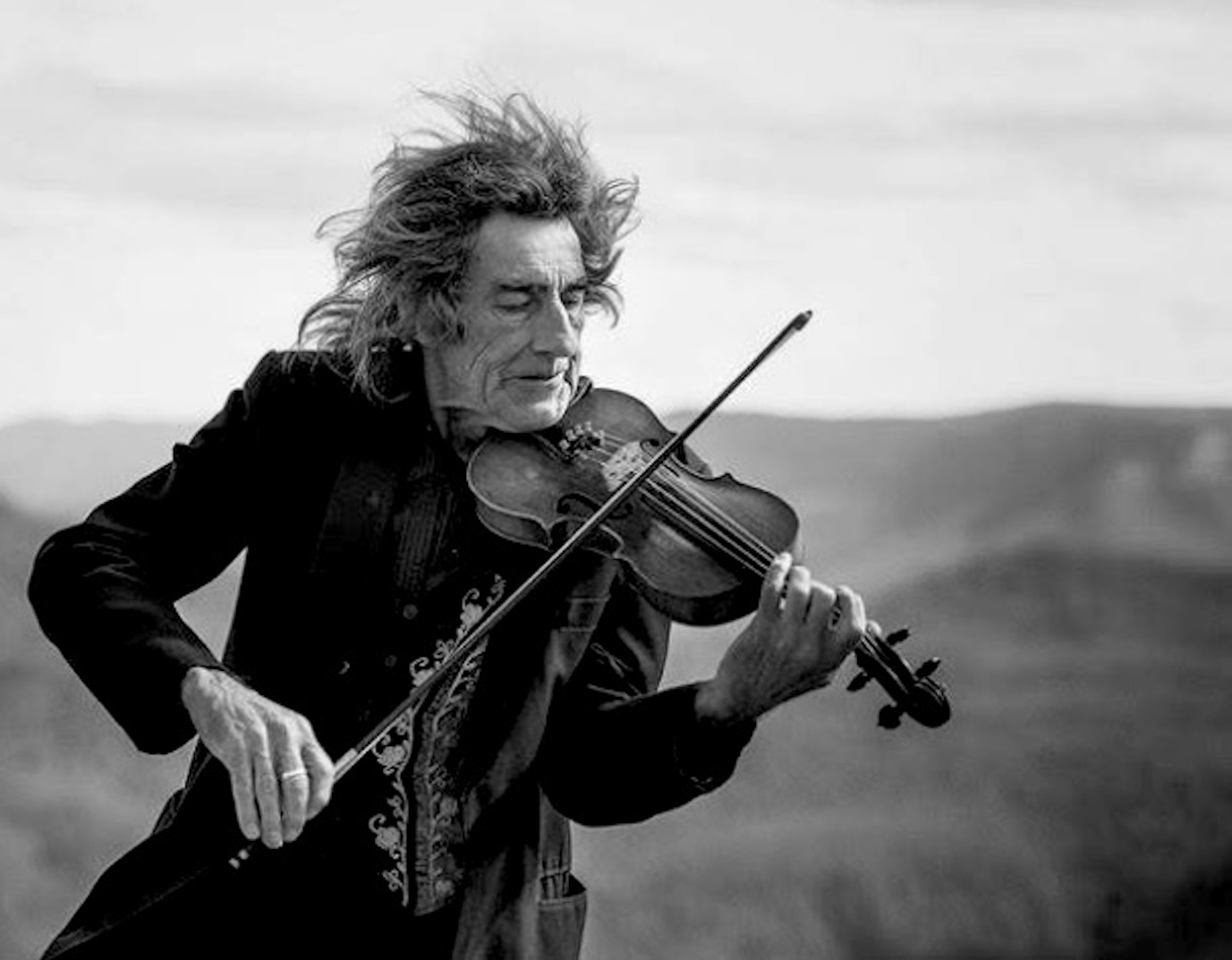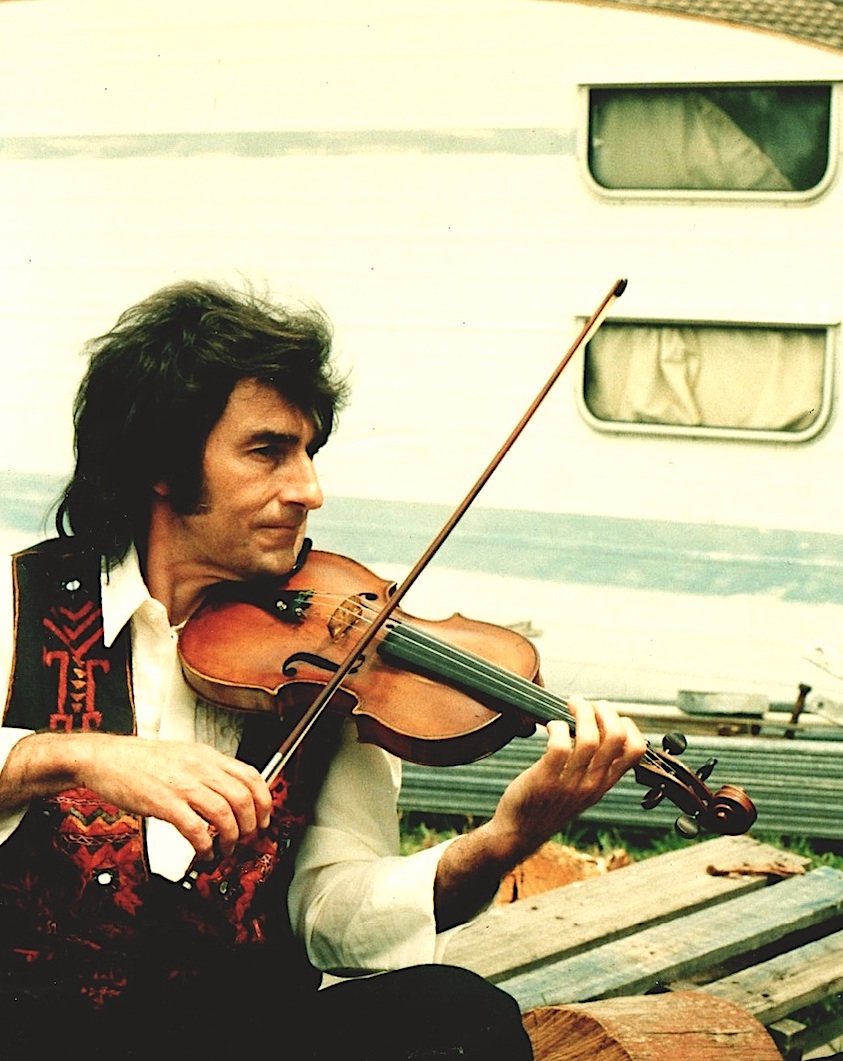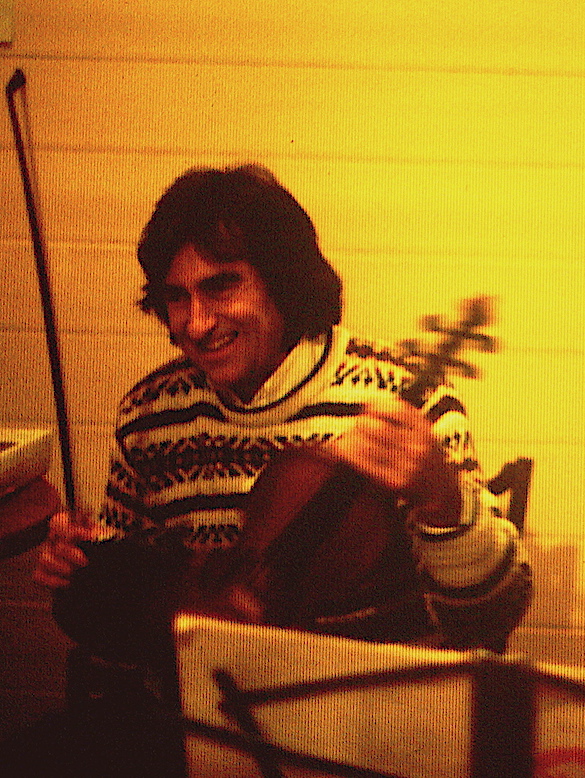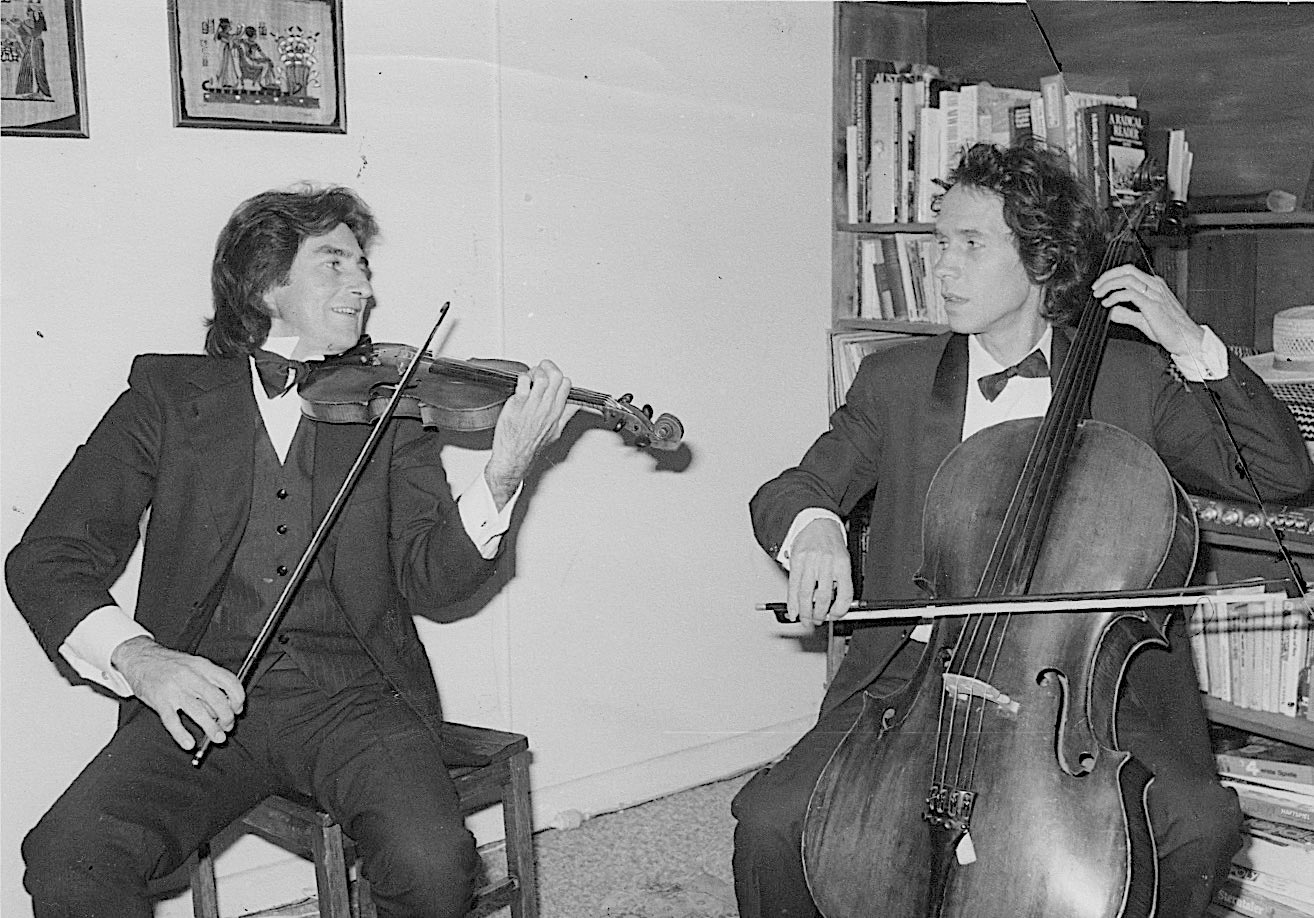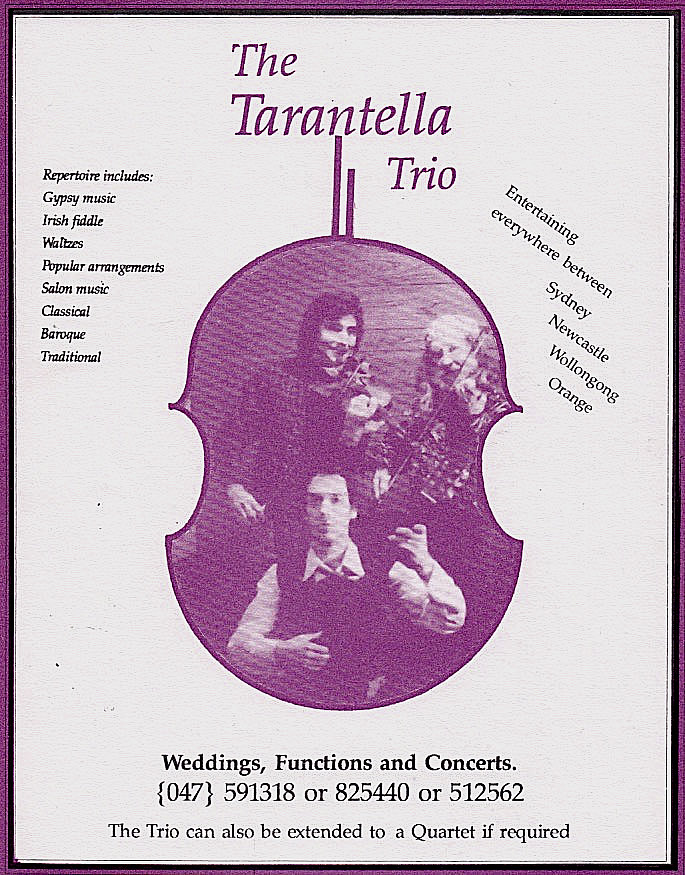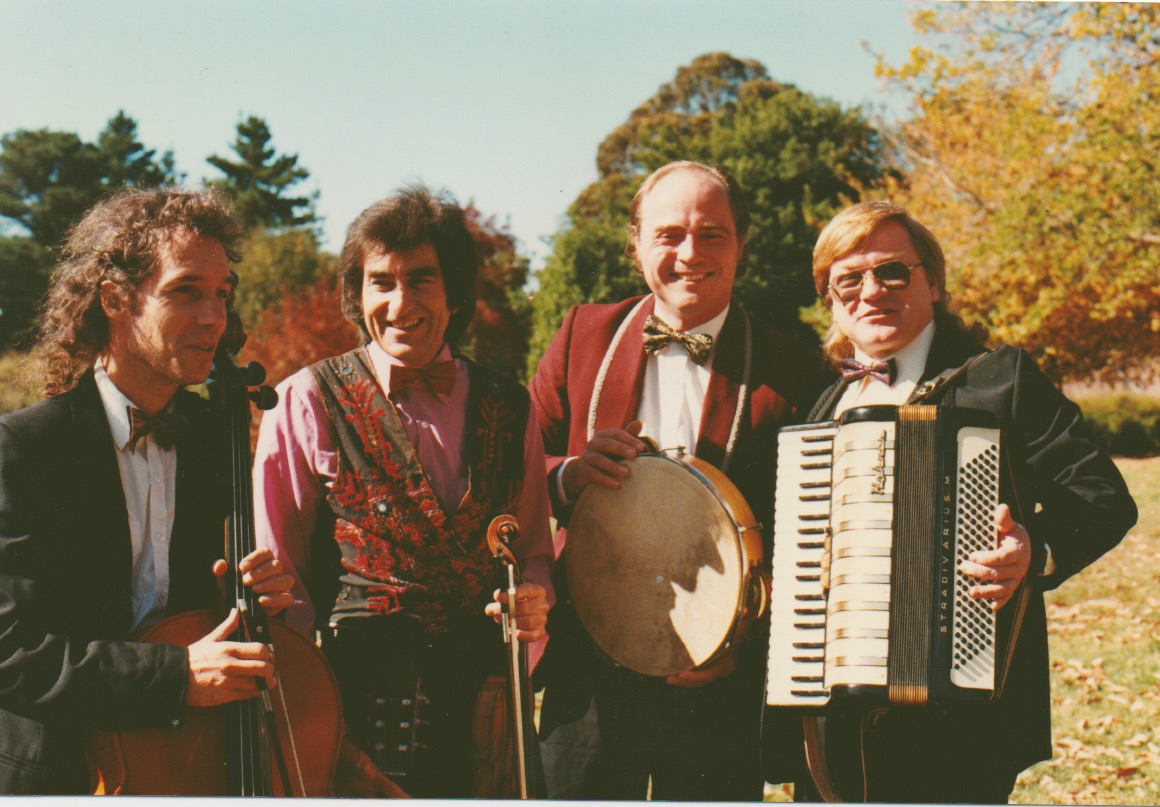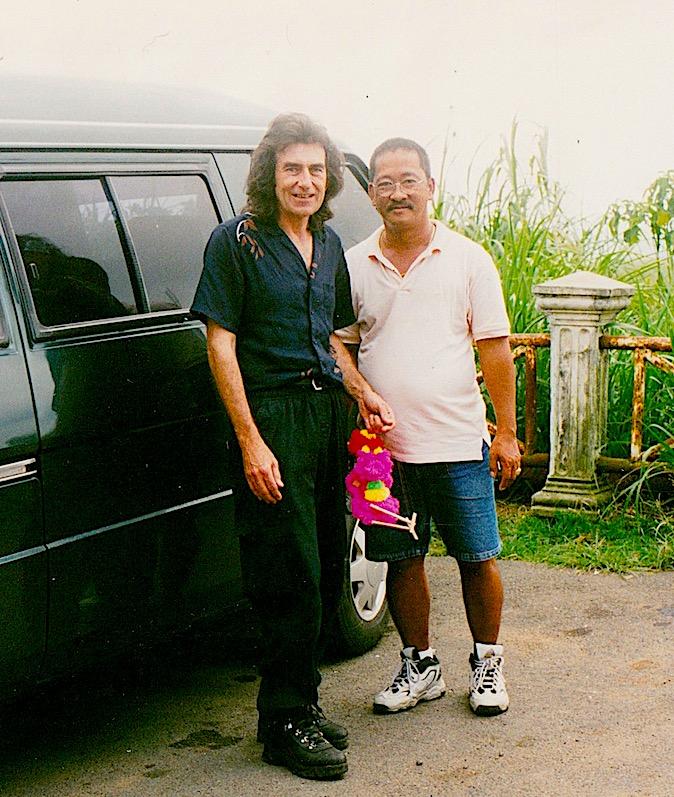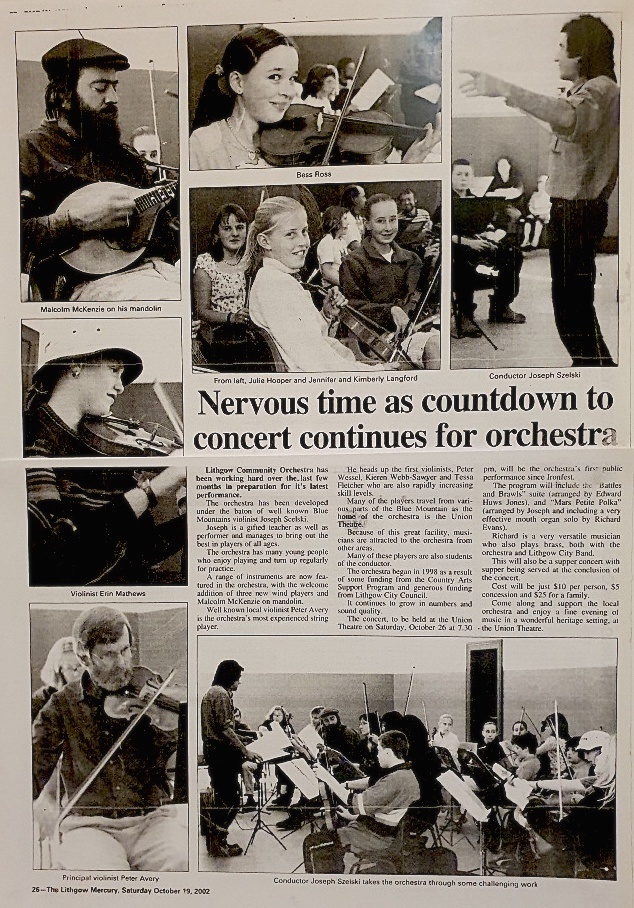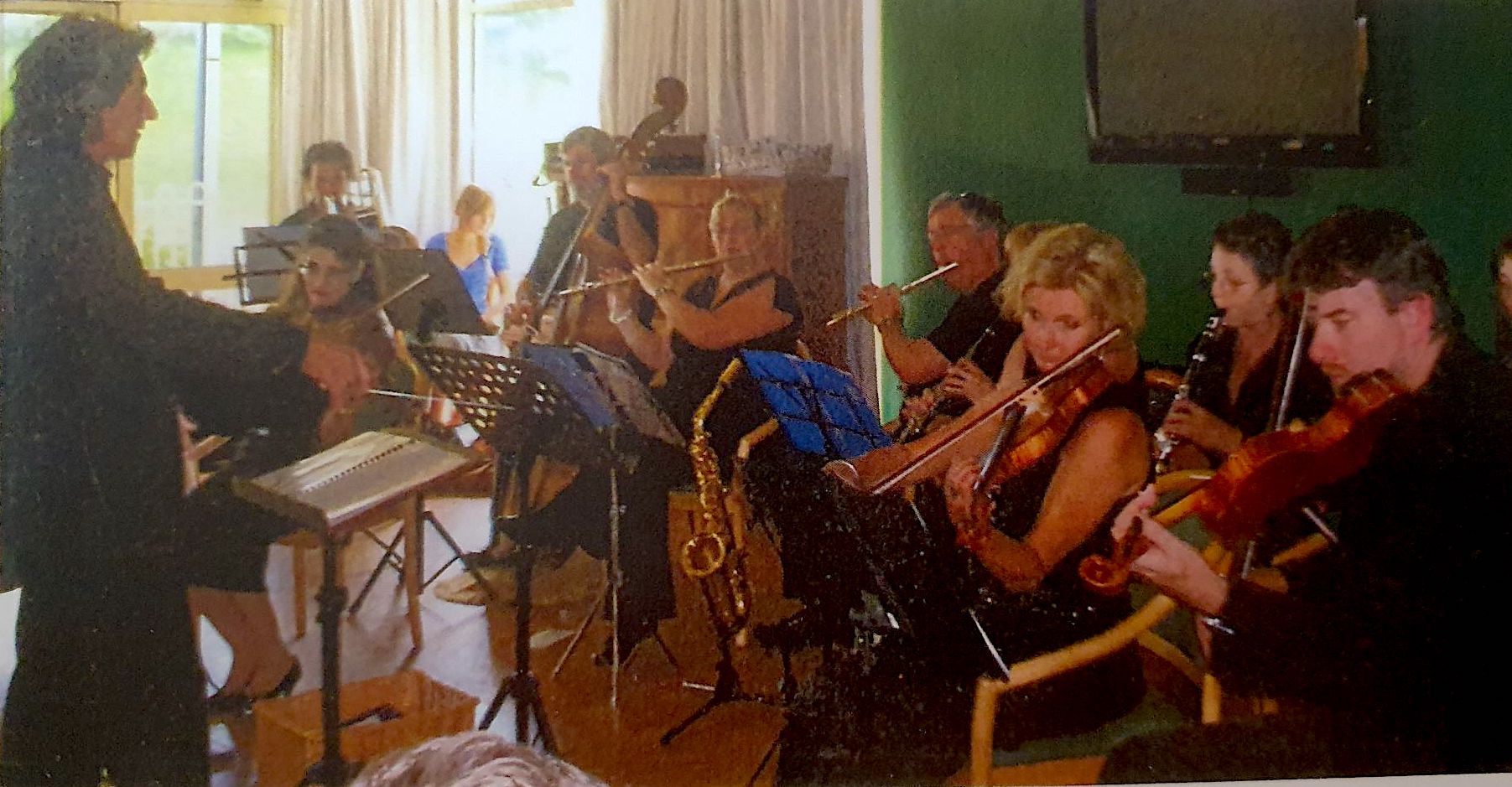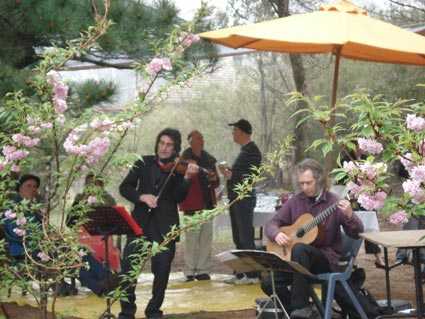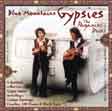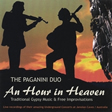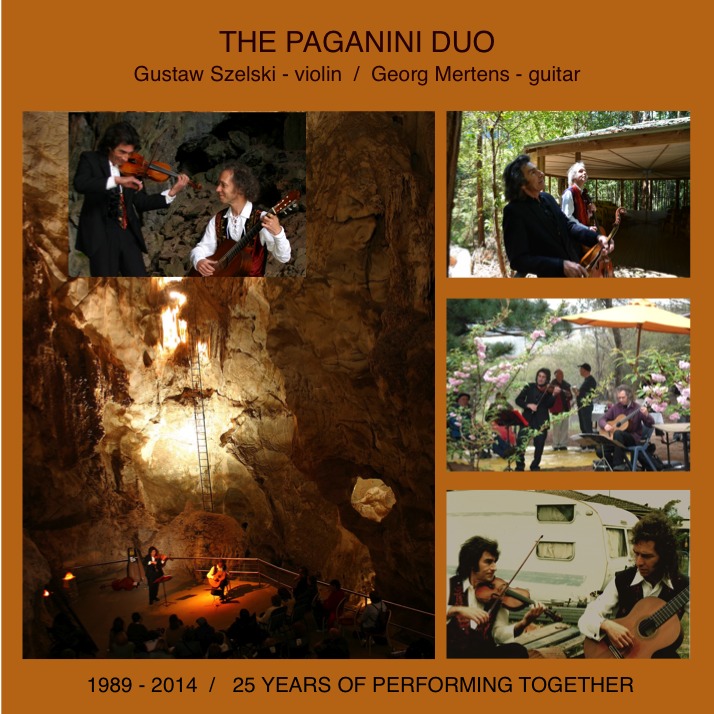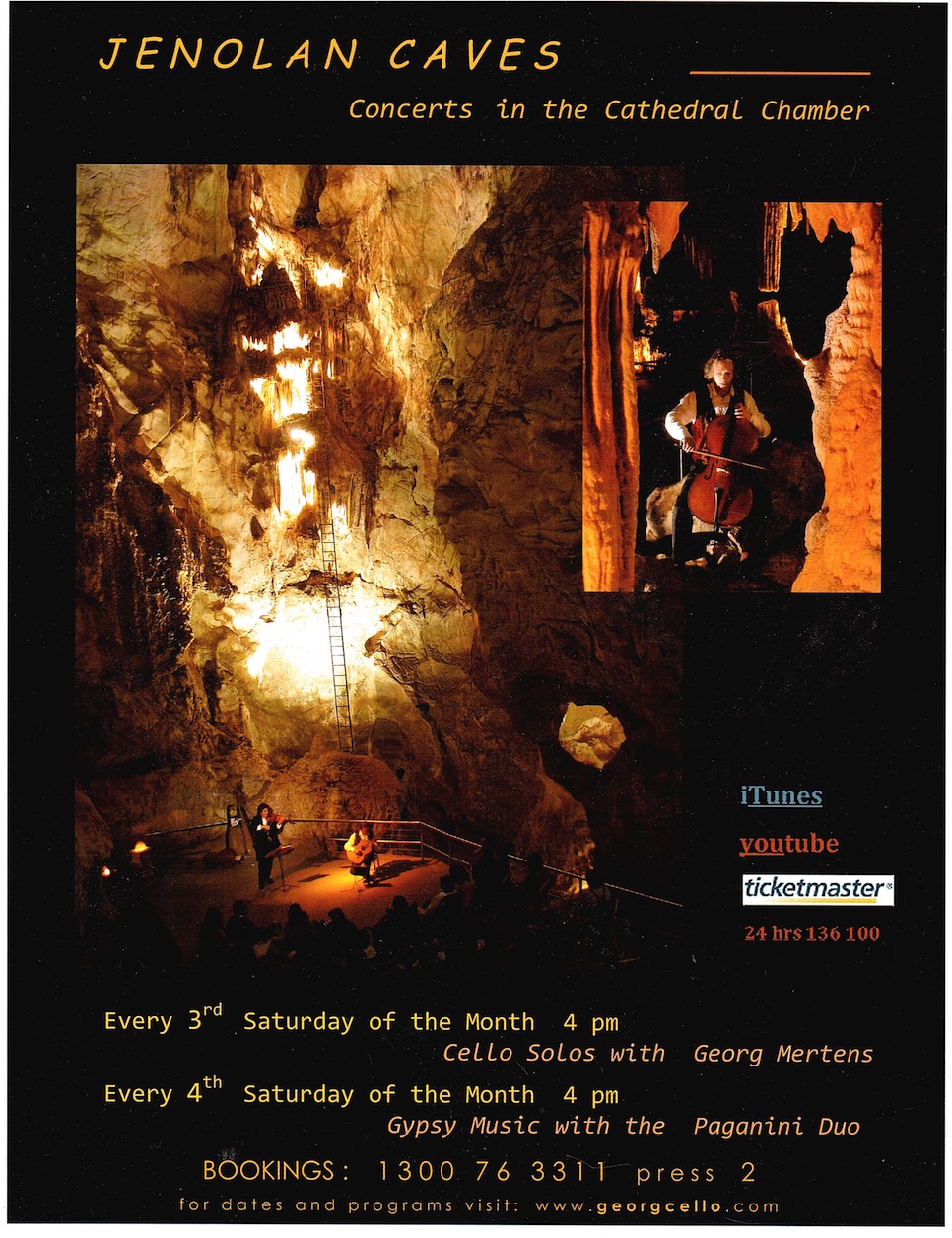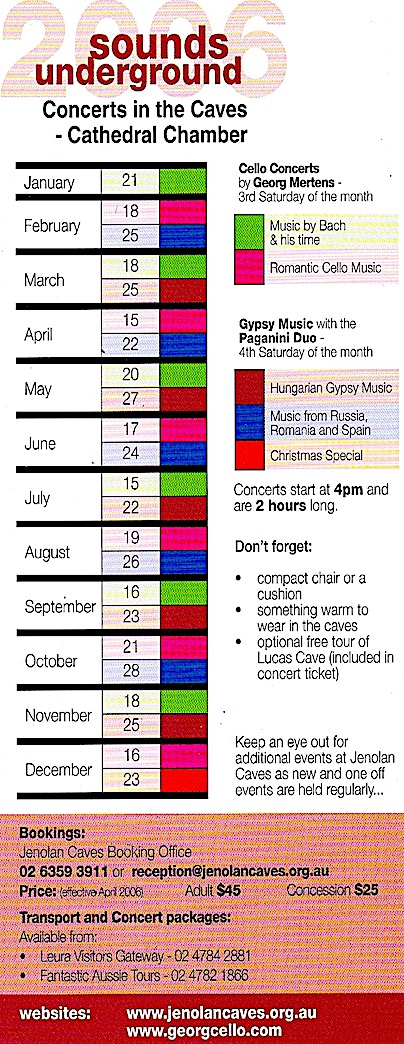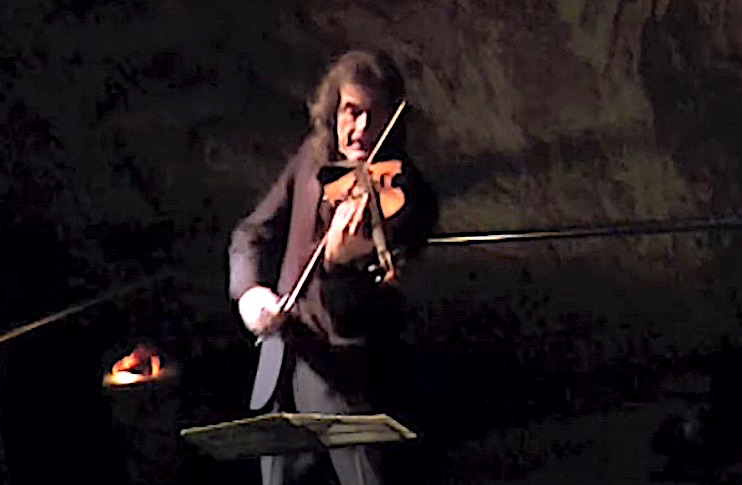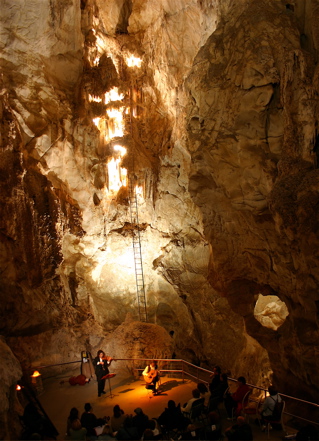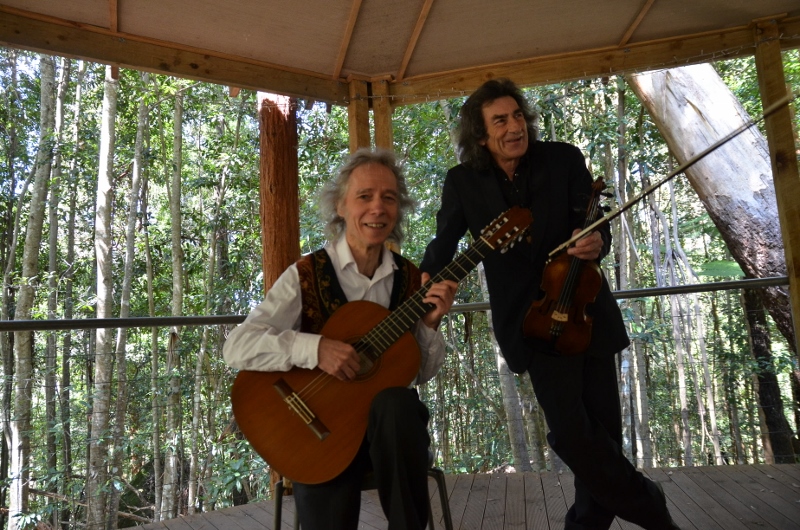Return to the Homepage of Georg Mertens
Sheet Music
Compositions
Arrangements
for solo, duo trio
cello & guitar method
Online Cello Course
Very detailed video lessons
based on My CELLO METHOD
from the very beginning
to Haydn Cello Concerto
(no prior knowledge required)
The Six Cello Suites by J.S. Bach
Analysis - interpretation
Editions - History
Harmonic Analysis of
Preludes 1 & 3
Violinist Gustaw Szelski
1950 - 2021
The Paganini Duo
Jenolan Caves Concerts
Youtube channel -
Solos, Duos,
The 6 Bach Cello Suites
Cello Issues
Poems by
Georg MertensPoems by Han Shan
(Cold Mountain)
edited
by Georg Mertens
Gustaw Waldemar Joseph Szelski
(29 Nov 1950 - 15 Aug 2021)A Brief History of the Musical Life of Violinist Gustaw Szelski (click here)
The TARANTELLA TRIO (click here)
The BLUE MOUNTAINS TRIO (click here)
The JENOLAN CAVES CONCERTS (click here)
RAINFOREST RECITALS (click here)
--------------------------
Gustaw is remembered by many for his passionate violin playing, full of soul and character.
Although he was very appreciated in entertainment like weddings and background music
- and people clapped and clapped - his real qualities and stage presence came to shine on stage in concerts.
After having played the Classical repertoire and entertainment
the audiences responded most to the few Gypsy pieces Gustaw played.
Consequently it became the focus for the concerts of the Paganini Duo.
Visitors had tears in their eyes and talked years later about the strong impression left.
Fortunately in his later life has been sufficient outlets to connect with audiences in this way:
The regular concerts at Jenolan Caves and numerous concert tours.
Luckily some have been recorded on video, today on Youtube.
Many otheres have been recorded audio and have been pubilshed on CD's and digital platforms.
----------------------
Gustaw was born in 1950 when his family lived at Villawood immigration camp (Sydney).
He was of Polish / Hungarian background and brought up on a diet of Gypsy music.
However his musical education was strictly that of a Classical musician and
at the age of 15 he completed his AmusA diploma.
After his HSC he studied violin at the Sydney Conservatorium of Music with Carl Pini and Harry Curby. He completed his studies with Ladislaw Jasek and became leader of the Sydney University String Quartet (Lyric Quartet) and then went on to play with Symphony Orchestras throughout Australia.
From 1978 Gustaw taught violin and free-lanced.
He performed with orchestras, quartets, trios, recording for commercial studios including ABC radio. He backed many artists including Rita Hunter, Hephzibah Menuhin, Shirley Bassey, Frank Sinatra, Peter Ustinov, Marcia Hines, John Denver and Tommy Tycho and the Little River Band.
Gustaw taught violin at Cranbrook School, Sydney Grammar, Central West Music Centre (now Mitchell Conservatorium) from 1984 to 1988 and Blue Mountains Conservatorium (1994 to 2000). He returned to teach at Mitchell Conservatorium from 2010 until his retirement in December 2015.
In the 1980’s he helped form the Ars Nova Orchestra which is now known as Orpheus Strings.
During that time he helped set up Blue Mountains Opera.
He collaborated with composer and music historian Bill Coates during the 1990’s in writing a book on the 31 note microtonal music. They received an Australian Arts Council grant to perform and workshop at music institutions throughout NSW. Following this they recorded 6 albums of music in the microtonal system.
Moving to the Blue Mountains he formed The Winbourne String Quartet.
--------------------------------
(Retold by Georg)
I met Gustaw incidentally in January 1989 and he asked me to fill in
for an accompanier who had cancelled.
The fusion worked extremely well, we became friends
and I moved up to the Blue Mountains the same year.
We ended up performing more than 2000 times together.From 1992 to 1998 we also created and published the directory of musicians and artists
in the Blue Mountains, Penrith & Lithgow.
Due to the increased work at Jenolan Caves we had to find in 1998 a new publisher to take over.
The arts directory is continuing to today in digital form known as Blue Mountains Arts Directory.
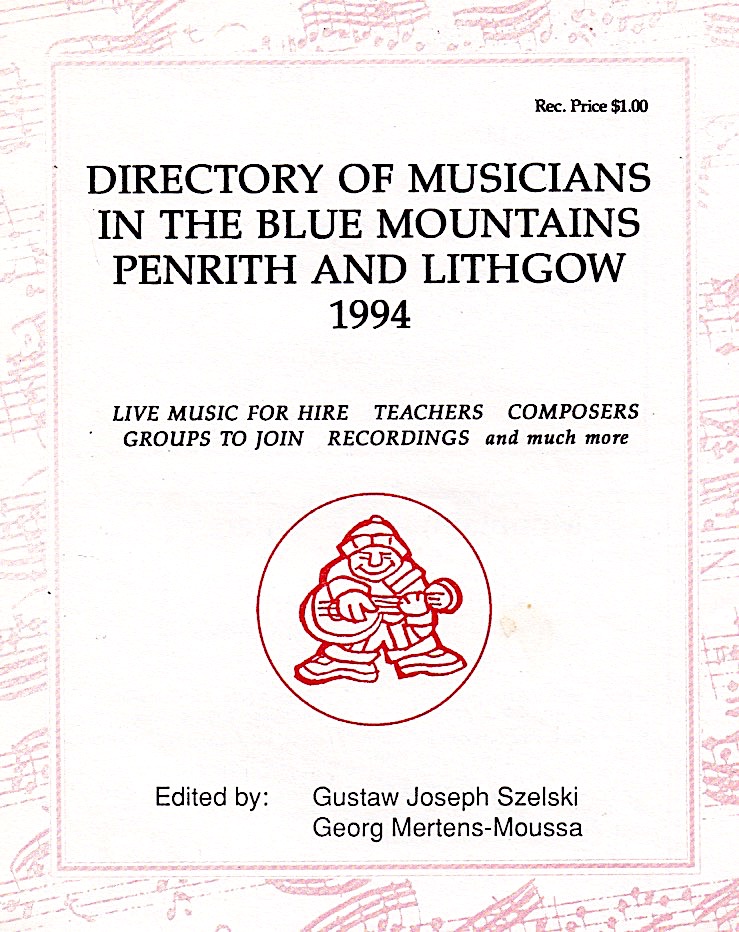
Musicians and later also artists Directory edited by Gustaw and Georg 1992-1998
The Tarantella Trio
Just at that time the cellist of Gustaw's Winbourne String Quartet was overseas,
which gave a chance to play together.
A short time later we formed the Tarantella Trio together with second violinist Colin Dalby,
which became the most successful wedding & function ensemble of the greater Sydney and Blue Mountains area.
We played at more than a thousand weddings and functions -
the peak was 11 gigs in a week.
The Tarantella Trio on back page of music directory
At the Blue Mountains Music Festival in 1992The Tarantella Trio came to a sudden halt when 2nd violinist Colin suffered a stroke.
-------------------------------The Blue Mountains Trio
New contacts were made and friendships formed when editing the musicians directory.
We started playing together with Gavin Tipping,
director of music at the Blue Mountains Grammar School.
And another ensemble was born: The Blue Mountains Trio,
which was to become our focus fom 1995 - 1999.
The Blue Mountains Trio with drummer Jamie Britten
- we performed in this combination under the name "Pluck - Bow - Bang"
Description of our Blue Mountains Trio:
The Trio plays the most wonderful collection of some of the most delightful melodies of an age
when society was rather indulgent in both style of entertainment
and the musical selection chosen to accompany its grand style of dining.If you have experienced breakfast at Tiffany's, High Tea at Harrods, Dinner on board the Titanic, or Supper on the Zeppelin....
This collection is for you.
Immediately you are transported to the grand era when life moved a little slower and the finer movements were savored a little longer. -
The selection of their music includes one of the finest - if not the finest - arrangements of
the Blue Danube, Pachelbels Canon, La Paloma, Perfect Day, Danny Boy and real rare gems, whose composers are hardly known today.
Their repertoire is vast and versatile compassing nights of music.The Blue Mountains Trio was from 1996 to 1999 the major attraction at Chisolms Grand Dining Room at Jenolan Caves House.
Guests were arriving from Sydney dressed up to enjoy music in Vienna style.
The Blue Mountains Trio was engaged for the Jenolan Caves House resort from March 1995 to 1999.
Performed was weekly between 4 times to just Saturdays.
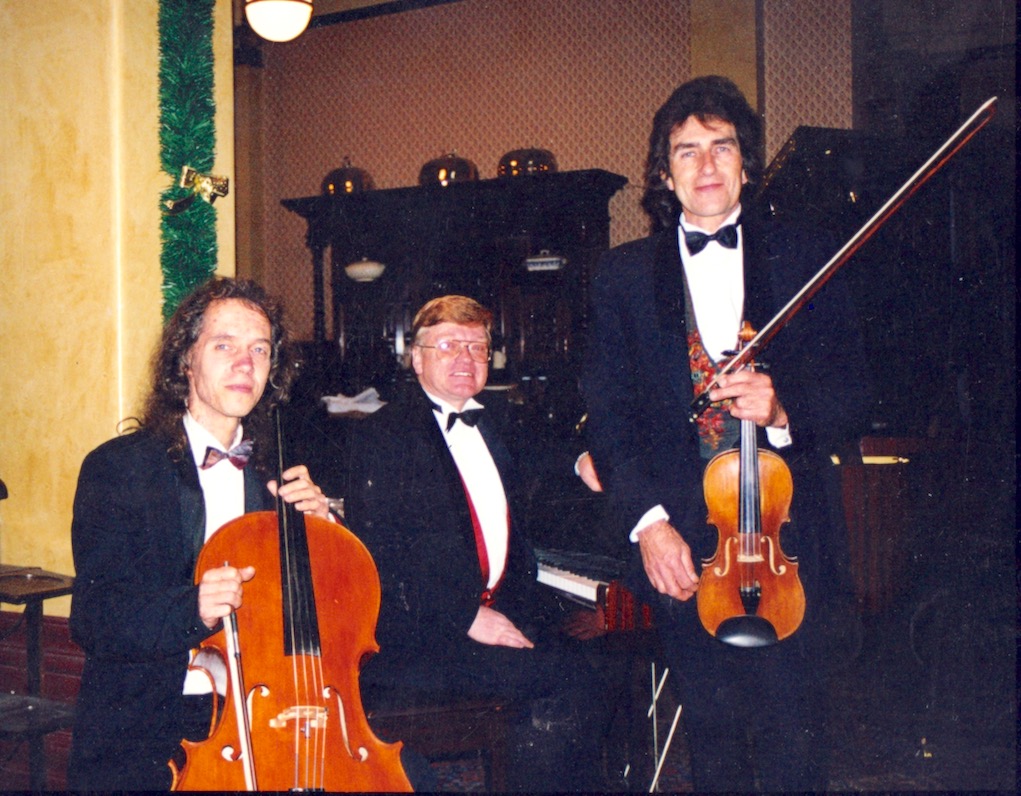
The Blue Mountains Trio at Jenolan Caves HouseFor the first years their CD "Music for Grand Dining" was sold only locally,
in Katoomba in the Blue Mountains in Australia (that's where the "Three Sisters" are) .
Within 2 years more than one in a hundred of Blue Mountains people owned one!
One of the top hotels in Katoomba copied our "Cafe Continental" and put it on a loop.
We went in to listen and left after hearing it for the ninth time in a row.
(for playlist click on CD)
In 1999 Gavin moved overseas.
We accompanied him, played for his wedding and toured the Philippines.
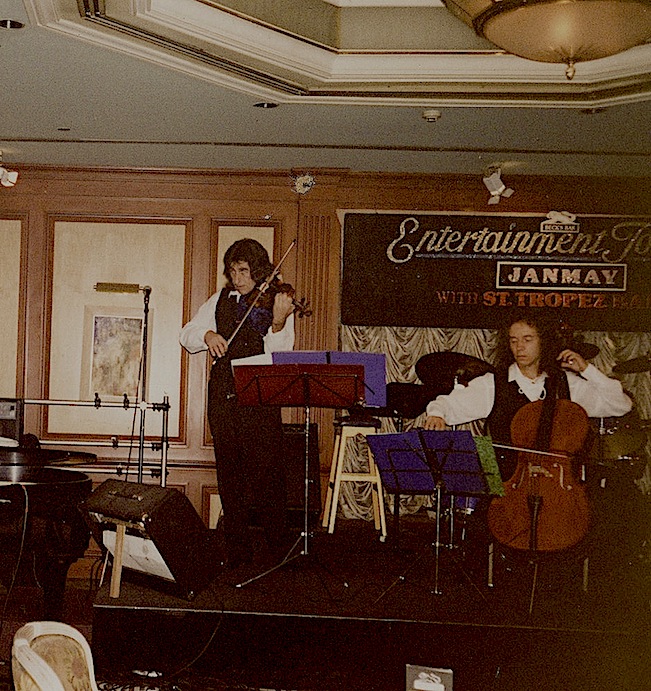
(left) Performing at the Grand Boulevard Hotel Manila - (right) Gustaw in the Philippine rice fields
Gustaw with our driver in the Philippines.
Gustaw learned Tagalog, the Philippino language with an extraordanary ease and speed. He mentioned he always loved languages, but in Australian schools it is never taught.
He felt that being a translator woud have been something he would have enjoyed too.
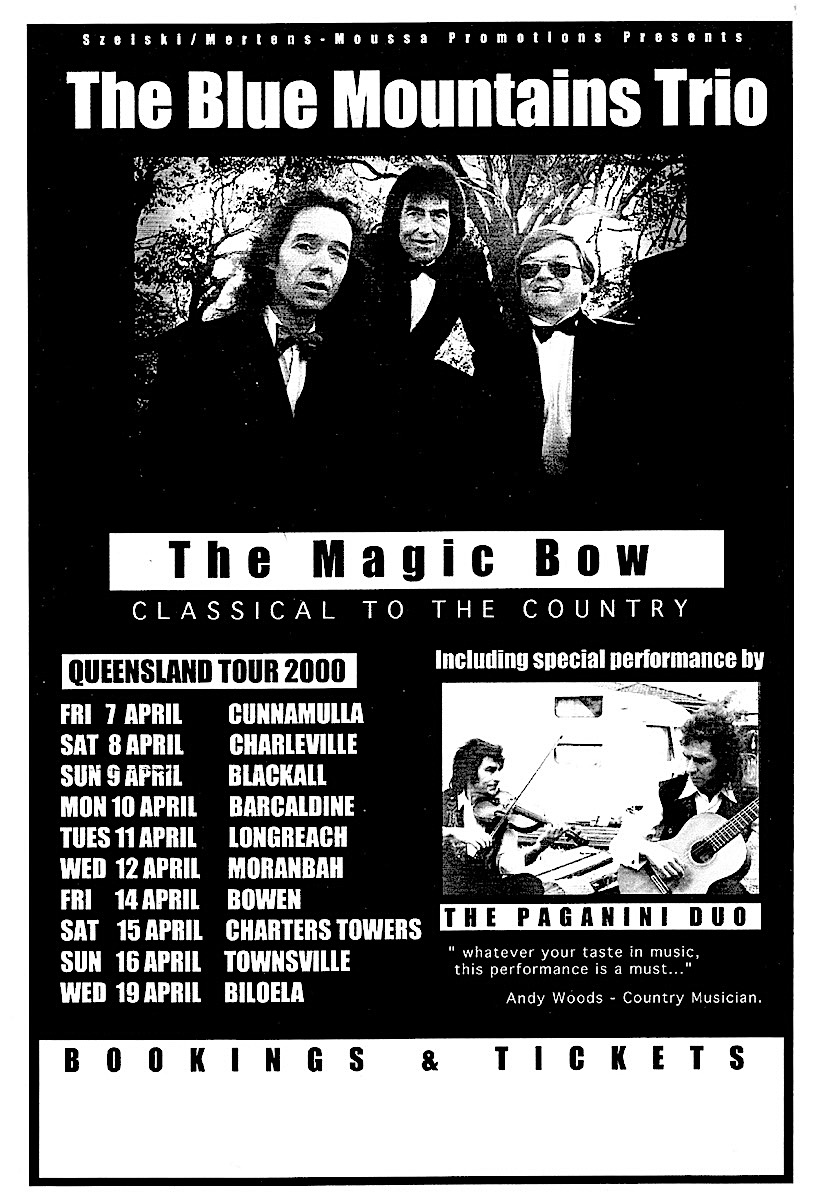
(left) One of our Queensland tours when Gavin visited AU - (right) car breakdown, Gustaw getting reception out WestCONDUCTING the LITGOW COMMUNITY ORCHESTRA
In the late 1990’s he helped form the Lithgow Community Orchestra (now Lithgow City Orchestra). During that period Gustaw conducted, tutored, composed and arranged pieces for performance at local events throughout the Blue Mountains and Greater Lithgow Region.
He was able to nurture the development of all members, no matter their age and skill level, to produce a cohesive and euphonious sound.
He remained their conductor until the end of 2020 when he decided “after 64 years of music it was time to hang up the spurs”.
He will be remembered as a generous, charismatic and multi-faceted man who leaves behind a rich legacy among his loving family, friends and the musical community.
Here some memories taken during these 21 years.
The Lithgow Mercury Sat 19 December 2002
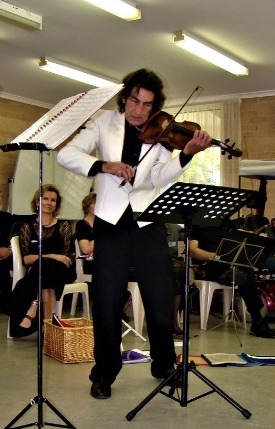
-----------------------------------
The Paganini Duo
Already during the early times of the Tarantella Trio a friend asked if we would be prepared to play
just as a Duo and maybe with some guitar as well.
At the following Duo gig people enjoyed it so much we got a job offered at the local golf club straightaway. The Paganini Duo was formed!
In difference to playing wedding music
we decided to focus more on Gypsy music and mainly for concerts.
After often requested we recorded in 1996 our first Duo CD "Blue Mountains Gypsies",
though as it happens, we got just then busier with the Blue Mountains Trio,
it remained like that until Gavin's departure.
Two temporary Trios were formed, with pianist David McKay & viola player Conrad Hornung.
A Wedding in the Blue Mountains with the Paganini Duo
( photo George Winston)I might mention one important musical performance for both of us, a concert at "The Rocks", Sydney's oldest part.
In the second half was Paganini's "Centone di Sonata" on the program. When putting our music on the stand during the break I realised I had forgotten my music at home. Just the Paganini! Gustaw said in his style:
We play a few numbers and give them the money back.
But I had the idea to improvise and was keen to try it. As trained Classical musicians we had never done it.
The audience seemed young and very accepting and expecting some avante garde. We gave the "piece" some name.
We arranged only the following: We start and finish in D minor, I start on the guitar and Gustaw enters then. When one of us wants to finish, he plays a longer trill and we steer ahead to finish in D minor.
After the concert quite some guests asked if "that piece" is on the CD.
We both believed they were cynical, it was a joke.
But we recorded the concert and to our surprice it sounded really interesting, even for us.
Since then we included in all our concerts at least one improvisation
(several are recorded on youtube and on the later CD's).
After more than 1000 weddings
our new focus became concerts, both at Jenolan Caves and touring.-------------------------------------
CD's
(click on CD icon for link to purchase/digital distributors)
In 1996 the Paganini Duo recorded their first CD "BLUE MOUNTAINS GYPSIES".
From 2004 - 2007 the Paganini Duo recorded many of their concerts in the Cathedral Chamber.
The most exciting of these Live recordings have been released on CD on their album:
"An Hour in Heaven" (2007).
The title chosen was a commont by one of the concert visitors,
who shook our hand and said" Thanks for an Hour in Heaven"CD "25 Years of Performing together (1989 - 2014)"
Recordings of our new pieces and new arrangements from 2007 - 2014.
A part of the recordings are from our last season of Live concerts at Jenolan Caves.
The other part has been recorded in Georg's music room in Katoomba.________
The Paganini Duo has played
for the weddings of the musicians: Roger Woodward, actor Jason Donovan, broadcaster Natarsha Belling
& Events for Gough & Margaret Whitlam, Barry Jones, Bob Carr &
to the 50th birthday of singer Doug ParkinsonThey performed at:
The Sydney Opera House, The Gulgong Opera House,
The Stockman's Hall of Fame (Longreach),
about a hundred hotels, art galleries, concert halls, churches, historic homes,
wine releases, Conservatoriums
and of course Jenolan Caves & Rainforest Room (Scenic World)
Broadcasts include:
TV -'The Great Outdoors', The 'Ray Martin Show'
'Sydney Weekender', 'Beyond 2000', 'Good Morning Australia', 'FRESH'
Channel 2,7 and 9
Radio stations including the ABC and 2MBS FM and many local radio stations.
The Concerts at Jenolan Caves
Jenolan Caves Concerts permanent poster without year specification (Photo: Michael Small) - Concert program calendar
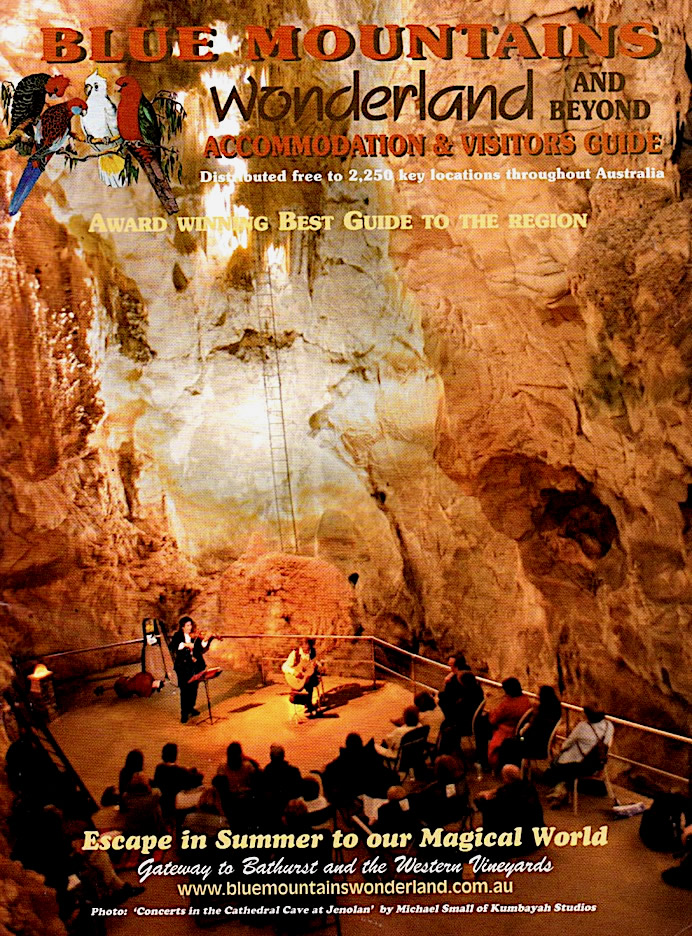
Title page of Blue Mountains Tourist magazine
Concerts in the Cave - History
1860's - The Cathedral Chamber was discovered (the first cave at Jenolan to be discovered, named the "New Cave"; only later the name Jenolan was given)
Soon the cave became known for its stunning acoustics - and used for church services.1920's - Dame Nelly Melba arrived by horse and cart to sing and experience the acoustics. No concert was arranged.
1970's - Dame Joan Sutherland sang in the Cathedral Chamber and stated: This hall has the most perfect acoustics I have ever sung in.
1980's - The Vienna Boys Choir drove up to sing in the Chamber with the famous acoustics
- John Denver visiting Australia did not want to miss singing in this hall famous for the purest acoustics in the world.
Again, no one organised a concert. No ticket was sold.
Lucky were the ones sharing the normal tour the musician happened to be in.
1990's - American audio companies booked the Cathedral Chamber to test their microphones. The large hall offering a large space, total silence and a short, but strong echo seemed perfect.
The Cello Concerts in the Cave
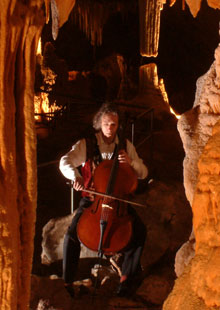
Bach in the Cave - Gypsy Music in the Cave (click on images for Live video)July 1997 - All the above stories were told to me by the Caves House manager at the time, Lorraine Duffy - I was playing as part of the the Blue Mountains Trio regularly at Jenolan Caves House.
When Lorraine told me about the world famous acoustic, I mentioned: "I would love to visit a concert there. Do you know when they are on?"
Lorraine: "There are none. Somehow no one organises them."
I answered: "I'd love to play there!"
A minute later the concept of the Cello Concerts in the Cave were born with the first starting 6 weeks later.
At this stage Gustaw was not keen as it was a risk project paid only by a cut of every guest turning up.
I was eager to prepare performing Bach Cello Suites looking ahead to the year 2000, Bach's 250th anniversary abd took a chance.
September 1997 - The first series of 4 cello concerts took place, called: Suite September (only Bach Suites).
I proposed to have from January 1999 on regular public monthly concerts on every 3rd Saturday of the month.
No contract was written, they continued for years just based on trust and direct conversation.
August 1999 - Up to now I knew personally at least a few people who would come.
This month I knew no one and was worried. This was the first concert sold out.
2000 First CD recorded in the Cathedral: "(Cello) Music at Jenolan Caves". 2000 - 2002 - I received great free support, among them Qantas magazine and Sydney Morning Herald.
Gypsy Concerts in the Cave with the Paganini Duo
In 2002 most concerts were sold out; the caves manager at the time suggested to start a second series.
I suggested of course concerts with Gustaw.
January 2003 - First concert with the Paganini Duo on every 4th Saturday of the month, performing Gypsy music and South American music.
2006 - The Concerts in the Cathedral Chamber won the "Flagship" tourism award (Minister for Tourism of New South Wales)
2007 - release of second CD of the Paganini Duo Concerts: "An Hour in Heaven"
January 2013 - 10 Years of Gypsy music in the Cave with the Paganini Duo.
21 December 2013 - last cello concert in the Cave (200th).
26 December 2013 - last Gypsy concert in the Cave with Paganini Duo, completing 11 years and 141 concerts.
Our last Note:
PLEASE NOTE:
Due to the conditions set by the current management
the concerts at Jenolan Cave's Cathedral Chamber sadly finished in December 2013
with our 341st concert (sold out).
We wish to thank our 15 000 visitors, which whom we could share over 16 years
experiencing fabulous music in this amazing place famous for the world's purest acoustics!
(The series stopped due to impossible conditions set by the new general manager at the time)The famous Acoustics in the Cathedral Chamber -
world's purest
The exceptional acoustic properties
of the Cathedral ChamberWe separate the main acoustic properties of a performance space into two categories:
firstly the basic noise level, the potential to provide total silence;
secondly the reaction of the space to the music performed, the quality of the reverb, commonly called echo.
In both the Cathedral Chamber is absolutely exceptional.Zero noise level
No car, plane or any artificial noise of our high tech environment enters this space, not even the sound of birds and wind. No signal for mobile phones penetrates the walls.
The cave is absolutely silent. The same massive rocks which shelter the inner cave of any outside noise provide the space with silent air conditioning keeping the temperature at 15 degrees for the last thousands of years, independent of seasons, independent of the outer world.
In a way we are transported back - just for an hour - into a much simpler and purer world sharing the mellow sounds of the cello or exciting Gypsy music. The concerts in the cave allow us to side step from our normal speedy, noisy and stressful environment.
Sound projection, reverb and echoAs to the quality of the echo, no amplification is needed here; the large size of the hall with the hard rock surface amplifies the music so well and clear, we can hear in the last row as if the performers are sitting just next to us.
What is different to other large halls is, that most have flat (stone) surfaces resulting in a clearly defined echo, which interferes with the clarity of the sound.
In many Cathedrals a note may linger for 8 - 15 seconds. This note will interfere with the notes following. Gothic churches supply us with such an echo; you can virtually feel the largeness of the hall, but any fast passage turns into a blur.
Studios are therefore equipped with a wall surface deadening the sound. It reassures clarity - echo and reverb are added artifically.
But here the Cathedral Chamber is exceptional: the surface is naturally uneven, many side caverns are going off, no flat surface can reflect a clear image - instead all sounds are naturally diffused. The sounds spread irregularly in all directions and give us a natural warmth.
The echo of the Cathedral Chamber is very strong and very short - about 1.5 seconds - then we have silence again. A unique hall, silent in seclusion, amplifying the music strong and rich - and also clear and pure; like an accidental natural wonder suiting music performance.
The height above the performance spot is the highest in the caves system - 54m;
compared to buildings this is like a 18 storey building!
This feature adds an extra ambience to the sound.
Particularly in the Cello Concert you could hear compositions - newly composed or transcribed - especially using the potential of the acoustics of the Cathedral Chamber.
The old age of the Caves
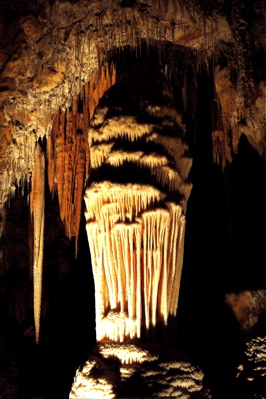
Jenolan Caves 340 million years old: study
Cave-dating research published by Australian geologists has found that the Jenolan Caves, in central NSW, are the world's oldest discovered open caves.
In a study published in the June issue of the Australian Journal of Earth Sciences (Vol. 53, 377-405), scientists from CSIRO, the University of Sydney and the Australian Museum - in cooperation with the Jenolan Caves Trust - have shown that the limestone caves, which attract thousands of tourists each year, date back more than 340 million years.
Until 20 years ago most scientists thought the Jenolan Caves were no more than a few thousand years old. In 1999 geologists estimated that the caves might be between 90 and 100 million years old.
Dr Armstrong Osborne, a senior lecturer at the University of Sydney, has long suspected that the caves are older than had been widely recognised, but says he was surprised to find they dated back to the Carboniferous (290 to 354 million years ago).
"We've shown that these caves are hundreds of millions of years older than any reported date for an open cave anywhere in the world," Dr Osborne says.
"Even in geological terms, 340 million years is a very long time. To put it into context, the Blue Mountains began to form 100 million years ago; dinosaurs became extinct 65 million years ago, and Tasmania was joined to the mainland as recently as 10,000 years ago.
"Most people were convinced that caves were quite young, and those of us who thought they were really old couldn't find any evidence. But no one imagined that they would be more than 300 million years old. This was totally off the planet."
The study used clay-dating methods that CSIRO's Petroleum Resources division developed to help oil exploration companies find oil deposits. The technique is a variation of conventional potassium-argon dating, which can calculate the age of minerals by measuring levels of decay caused by radioactive potassium.
CSIRO Petroleum Resources researcher Dr Horst Zwingmann says the age of the caves was determined by dating the clay minerals that crystallised when volcanic ash entered the caves, and which now forms much of the mud in the Temple of Baal and Orient caves.
"We were able to provide evidence that the clays did form in-situ in the caves and that the sections regularly visited by tourists actually formed in the Carboniferous," Dr Zwingmann says.
"This study shows how industry-focused research techniques can also be used to solve more general geological mysteries."
The Australian Museum carried out initial studies using X-ray diffraction and scanning electron microscope imaging to identify clay minerals and their properties to see if they were suitable for dating.
Images are available from CSIRO Media Liaison
Further Information:
Dr Horst Zwingmann, CSIRO Petroleum Resources
Dr Armstrong Osborne, University of Sydney
Media Assistance:
Deanne Paisley, CSIRO Petroleum Resources
www.csiro.auRainforest Recitals in the "Rainforest Room" in Jamieson Valley
Starting the month after the end of the Concerts at Jenolan Caves we venture to another style of concerts within nature - Rainforest Recitals in the Rainforest Room in Jamieson Valley,
in the middle of Blue Mountains National Park, reached via scenic railway, part of "Scenic World"
georgraphically belonging to Katoomba - our home town.
In 2014 we realeased the CD "25 Years of Performing together" by the Paganini Duo
including compositions, arrangements and new material introduced to the Concerts in the Cave since the 2007 CD recording also including music from the Rainforest Recitals.
Unfortunately shortly after, our concerts had to be cancelled due to Gustaw's increasing battle with emphysema.
Georg and Gustaw at the "Rainforest Room"
